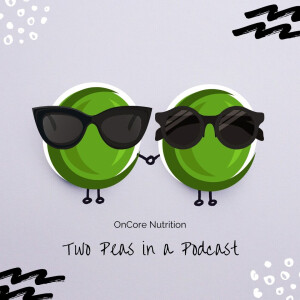
OnCore Nutrition - Two Peas in a Podcast
Health & Fitness:Nutrition

Episode 11 - diet soft drinks, artificial sweetener, carbonation and which milk to choose
 2019-11-27
2019-11-27
SHOW NOTES
Diet soft drinks
Diet soft drinks often replace sugar with artificial sweetener, often aspartame. Aspartame is around 200 times sweeter than sugar, so a very small amount is all that is needed to sweeten a product.
Aspartame safety
Studies performed in 1980 by Joint Expert Committee of Food and Agricultural Organization + World Health Organization (JECFS) established the Acceptable Daily Intake (ADI) of Aspartame as 40mg per kg of body weight, meaning that the average person can safely consume around 3400mg of aspartame daily without any adverse side effects. Can of Diet Cola is around 180mg = 18 cans per day.
Health impact of artificial sweeteners
- Some observational studies have found high intake of artificial sweeteners and diet soft drink is associated with an increased risk of obesity and metabolic syndrome
- Diet soft drink may increase appetite by stimulating hunger hormones (Grehlin), altering sweet taste receptors and triggering dopamine responses in the brain
- Predispose us to want sweet, calorie dense foods and fluids
- Observational (diet soft drink leads to weight gain) vs experimental studies (swap to diet soft drink leads to weight loss, but beware of funding source and bias)
- Link to weight gain possibly from above, possibly from pre-existing poor dietary habits. One study of over 300 overweight participants - drink 710ml diet soft drink or water per day for a year. At the end of the study, the diet soda group had experienced an average weight loss of 6.21 kg compared to 2.5 kg https://www.ncbi.nlm.nih.gov/pubmed/26708700
- Bias in the scientific literature - some studies (including this one) funded by the artificial sweetener industry have been found to have more favorable outcomes than non-industry studies, so we need to be careful when interpreting results.
- Observational studies have found a link between high intake diet soft drink and the development of kidney disease ? related to acid load on the kidneys from high phosphorus content.
- Gut microbiome: Artificial sweeteners alter the gut flora, leading to reduced blood sugar control. This may be one way diet soft drink increases the risk ofT2DM, but more research needed. https://www.ncbi.nlm.nih.gov/pubmed/27090230 https://www.ncbi.nlm.nih.gov/pubmed/25831243
- Be careful if you have low bone density - particularly with phosphorus containing drinks, so cola, and those with caffeine. PO4 interferes with Ca absorption.
At the end of the day, diet soft drinks offer no nutritional benefit. The ingredients list is empty and doesn’t offer anything positive to our health.
If you’re a regular drinker, set yourself a challenge. 21 days to change a habit. Set a target, recruit some friends, get a calendar going to mark off days and set yourself a challenge. Try our sparkling iced teas. Challenge to break the habit so you can enjoy sugar-free soft drink on occasion, but it’s not a must have each day.
https://www.nature.com/articles/s41430-019-0407-z
Carbonated water and teeth
https://www.ada.org/en
Milk
Cows milk full vs skim = change in ratios, no sugar added. Permeates ensure consistency in nutritional composition of milk.
Soy - similar nutritional profile - has to be by food standards law, plant-based, sometimes sweetened
Almond - low protein, low kJ, low fat, low CHO, low Calcium. Some are sweetened, some calcium fortified.
Rice milk - low is kJ, protein, high in natural sugars. Hypoallergenic.
Coconut milk - low in carbs and kilojoules, but is significantly higher in saturated fat than other non-dairy alternatives, lacks protein and calcium (unless fortified).
Oat milk - same kJ as cows milk, half protein, low fat, higher CHO, equiv Ca, beta-glucans (soluble fibre reduce chol reabsorption)
Comparison table:
https://www.healthychildren.org/English/healthy-living/nutrition/Pages/Milk-Allergy-Foods-and-Ingredients-to-Avoid.aspx
Heart Foundation guidelines
https://www.heartfoundation.org.au/news/new-advice-from-the-heart-foundation-on-meat-dairy-and-eggs
More Episodes
 2022-04-20
2022-04-20
 2022-03-30
2022-03-30
 2020-04-29
2020-04-29
 2020-03-25
2020-03-25
Create your
podcast in
minutes
- Full-featured podcast site
- Unlimited storage and bandwidth
- Comprehensive podcast stats
- Distribute to Apple Podcasts, Spotify, and more
- Make money with your podcast
It is Free
- Privacy Policy
- Cookie Policy
- Terms of Use
- Consent Preferences
- Copyright © 2015-2024 Podbean.com




